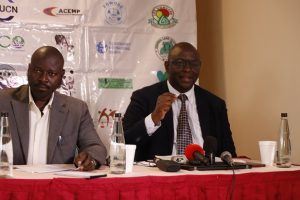CSCO members addressing the press
The Civil Society fraternity under the umbrella organisation, the Civil Society Coalition on Oil and Gas in Uganda (CSCO) has called for more government commitment to the Extractive Industries Transparency Initiative (EITI).
Addressing the press in Kampala on Thursday ahead of the launch of the 2nd EITI report for 2020/21, CSCO members urged Government to be more transparent and fix the loopholes that are leading to revenue leakages in the extractive industry.
Siragi Magara Luyima, the Energy and Extractive Industries Coordinator at Oxfam-Uganda and CSO Representative on the Uganda Multi-Stakeholder Group (MSG), said the EITI should improve the domestic resource mobilization but the extent to which natural resources contribute to Uganda’s resource envelop remains low.
“We are not getting as much revenue as we are supposed to get. For 2020/21, we only collected Shs241 billion from the entire extractive sector. That’s a paltry revenue; our potential is more than that. From mining sector alone, we only got Shs61bn in 2020/21; the mining sector has quadruple potential of that. Oil and gas contributed around Shs180bn,” Magara said, adding that this contribution in a full year shows “we are just jokers.”
“We are not doing what we are supposed to do. That’s a contribution of about 1.8% to GDP. In countries like Tanzania, mineral contribution to GDP is about 10%.”
On the 12th of August 2020, the EITI International Secretariat admitted the Republic of Uganda as the 54th member country of the Extractive Industries Transparency Initiative (EITI).
EITI requires governments and extractive companies to publish and reconcile data on oil, gas, and mining revenues as a mechanism for ensuring transparency, accountability, and subsequently, proper management of revenues that accrue from natural resources.
Paul Twebaze, a Research Fellow at ACODE, who read a statement from CSCO, said since 2020, a series of interventions have been undertaken to implement EITI in Uganda.
Some of these include: the establishment of the Uganda Multi-Stakeholder Group (MSG); engagement and consultative meetings; capacity-building sessions; and contribution to several policies, laws, and guidelines in the extractives sector.
Uganda has since developed and published two EITI reports. The first report (for the year 2019-2020) was published in February 2022, while the second report (2020-2021) was published on 30th June 2023.
Currently, he said Uganda is preparing for its first validation by the Global EITI Secretariat in October 2023, a process that will assess the extent to which the country is complying with the requirements of the EITI Standard.
The government of Uganda will launch its second EITI report covering the financial year 2020/2021 tomorrow the 15th September 2023.

Twebaze said under requirement 2.4 (a) of the 2019 Standard, countries implementing EITI are required to disclose all contracts and licenses that have been granted, entered into, or amended as of 1st January 2021.
“We call upon the Government of Uganda to expedite the process of publicly disclosing contracts and licenses that provide the terms for the exploitation of oil, gas, and minerals,” he said.
He added that the 2019 standard also encourages governments to integrate the impact of the extractives’ operations on the environment in their EITI reports.
The 2023 Global EITI conference also recommended governments to consider issues of energy transition and climate change in the implementation of EITI.
Twebaze says reporting on the impacts of extractive industries on nature and biodiversity will trigger actions that enhance sustainable exploitation of natural resources.
“We therefore, call upon the government of Uganda to expand the scope of EITI reports to include, the impact of extractive industries on the environment.” he said.
He added that given the prevalence of illicit financial flows in other mineral and petroleum-rich countries and the recent reports by the Office of the Auditor General regarding revenue leakages in the mining subsector, “we call upon the government to plug all the loopholes that facilitate revenue leakages in the entire mineral supply chain.”
The Civil Society also says that under requirement 2.5 of the EITI Standard, implementing countries and companies are required to publicly disclose beneficial ownership information.
“We are aware that Uganda Registration Services Bureau (URSB) has established a Beneficial Ownership Register. We however call upon URSB to put in place an assurance and due diligence procedure to ensure reliability of the information declared by companies and develop an online database,” Twebaze said on behalf of the Civil Society.
The Civil Society also called upon the government of Uganda to commit adequate financial resources to support the successful implementation of EITI activities.
Winfred Nuabiire from Global Rights Alert, asked the government to show commitment to EITI, noting that “we don’t want the initiative to be used as an exercise for showing off because we are not putting in practice the recommendations from the previous report…We don’t want to put resources in EITI year after year yet recommendations are just thrown out of the window.”

She said Uganda has 222 licensed companies in the mining sector as of 2020/21.






